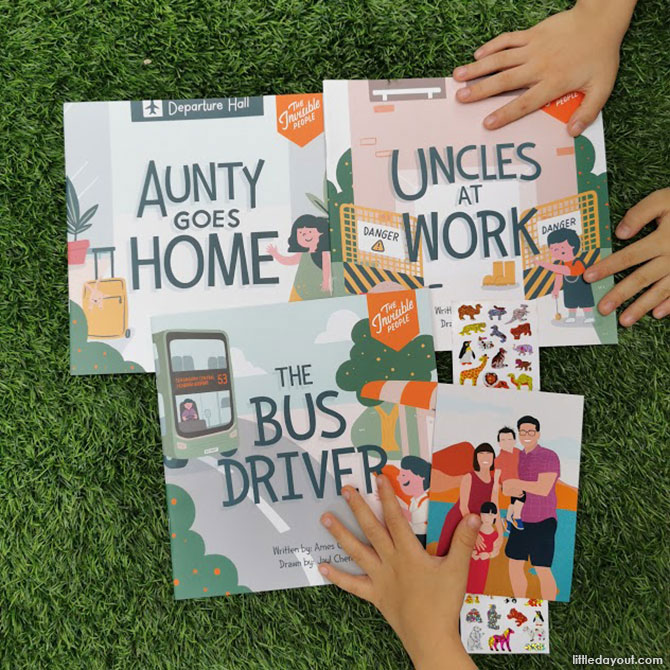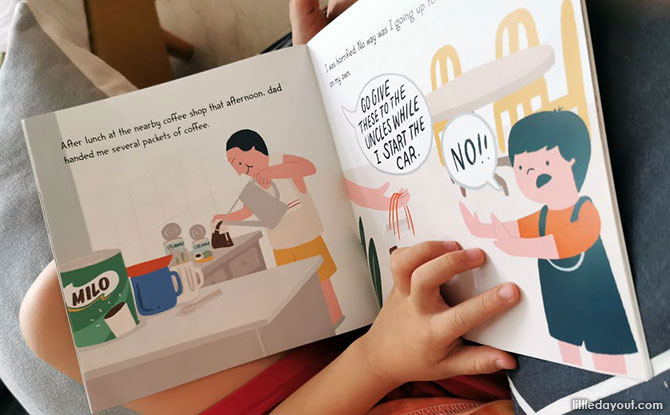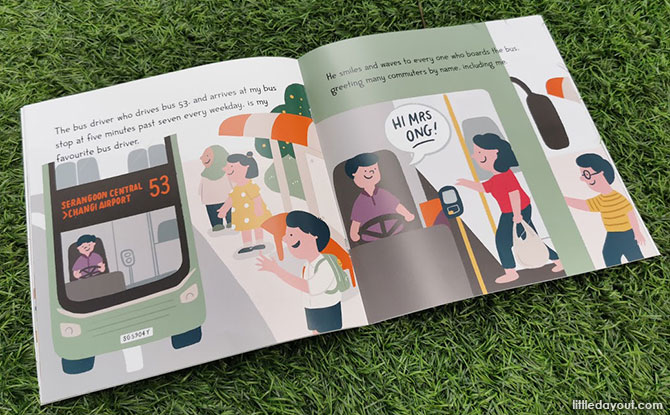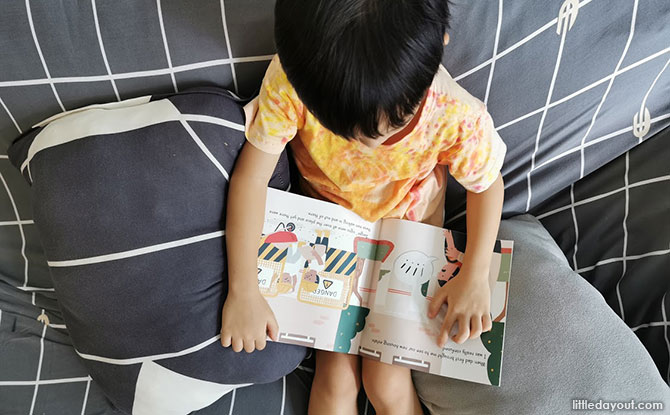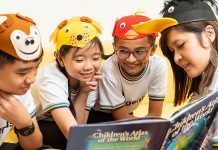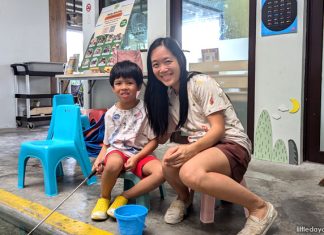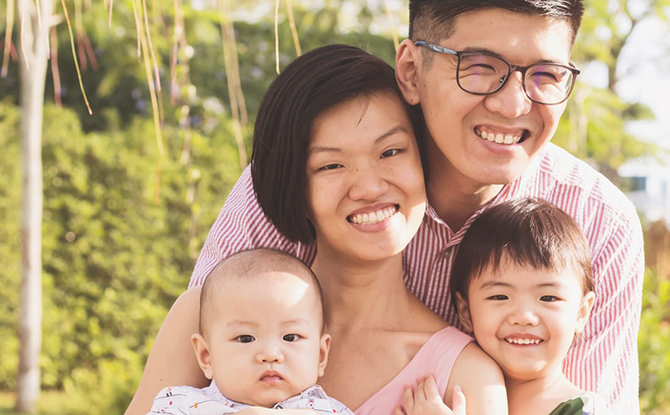
Bringing up children who are kind and compassionate, unprejudiced and empathetic is probably a goal for many. It isn’t an easy task given how most of the children grow up in privileged circumstances, neither needing to worry about shelter or the next meal. Given the prosperity of our city state, it is easy to look past the glitz and remember those who are in need.
Little Day Out’s Interview with Ames Chen
We speak to Ames Chen, author of the Invisible People Series, on why she wrote the books on the “invisible” people and how to encourage kindness and raise children who embrace inclusivity.
Tell us about yourself, Ames.
Hello! My name is Ames and I am married to my childhood friend Jonathan. We have two active children; Mya is 5 and Nate is 2.
I was a History teacher previously and now I am a student – doing a Masters in Intercultural Studies part-time. I do still teach part-time with a vendor, focusing on Leadership and Communication skills.
FREE FOR LITTLE DAY OUT PARENTS: Sign Up for a Free Trial with ACT 3 Academy to Find Out If Drama Classes are Right for Your Child
3 Recycling Adventures: Fun Ideas For Kids & Families
1:1 & Small Group English Lessons: How to Get Personalised, English Help
We love the outdoors and chose a home next to a park connector for that reason. We go on it for walks, jogs, and cycles easily three to four times a week! On the other days we take slow walks around our estate looking for snails, butterflies, and other beautiful things.
What is The Invisible People series about?
The Invisible People series really is a collection of real-life stories of job marginalised in society threaded together into children’s books. It focuses on the jobs that are usually unseen in society, jobs that are deemed dirty and undesirable.
In fact, The Bus Driver was inspired by a conversation (squabble) I overheard between two primary school boys in the train one time.
Boy A said to Boy B, “later you grow up you become a Bus Driver then you know!”
To which Boy B retorted, “Papa is a bus driver and a very good one, okay!”
They are about the people we don’t think about, the jobs we don’t talk about and the lives we often neglect to care for.
What motivated you to write the books?
The Invisible People series was born out of a school project (Urban Society) that focused on the marginalised in society. My project group focused on Foreign Domestic Workers, and the first title Aunty Goes Home was a recommendation to make the general public in Singapore more aware of their often-untold situation.
Uncles at Work has been the most popular title thus far, focusing on the unfair treatment of migrant workers, with the spotlight on construction workers. This was done with the help of the folks at SG Accident who allowed me to interview both staff and patients.
The final book in the series, The Bus Driver is Mya’s favourite and has a heart-warming twist at the end.
The reason why children’s books were chosen was the belief we had in the children and their readers. We wanted to empower the children to be a voice for The Invisible People rather than disappearing behind another website or newspaper article.
Children can read the same book again and again finding new gems each time. And when adults tell us they love the stories too, then we know we have done something right.
Why is noticing the “invisible people” important to you?
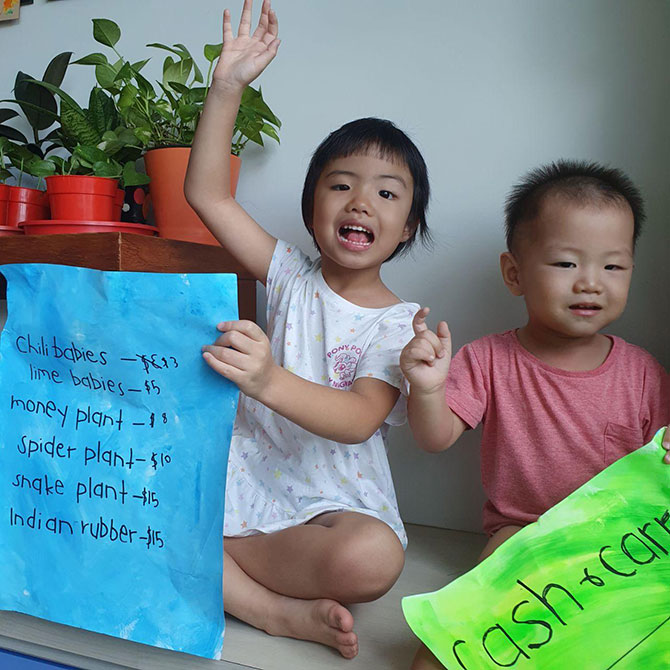
Becoming a mum has forced me to become conscious of what values I want my children to inherit and what kind of society I hope they grow up in. As Mya grew older, she started asking about about the garbage man, the grass cutter, the cleaner at the hawker centre and so on. This made me painfully aware of how hidden they are from us, and how we often pass them without second thought.
Thus, through this series, I hoped more children could start helping us become aware of others in society as Mya helped me.
It is important because they are also people with families and struggles. The immense value of a smile or a kind word to one who is invisible cannot be overstated. But kindness can only begin when we ‘notice’ them.
It took the cleaner aunty about two weeks to get close to the children. During the entire Circuit Breaker period, they would camp at our gate waiting for her to arrive. When she appeared, they would shout hello and wave. Initially she was wary and would only smile back. Over time, they ran to the kitchen to offer fruit, sweets and sometimes their own toys. And now, every morning she would spend a few extra minutes chatting with them from outside the gate. She has become an essential part of their morning routine and vice versa.
How do you encourage kindness and empathy in your children? How did your children respond?
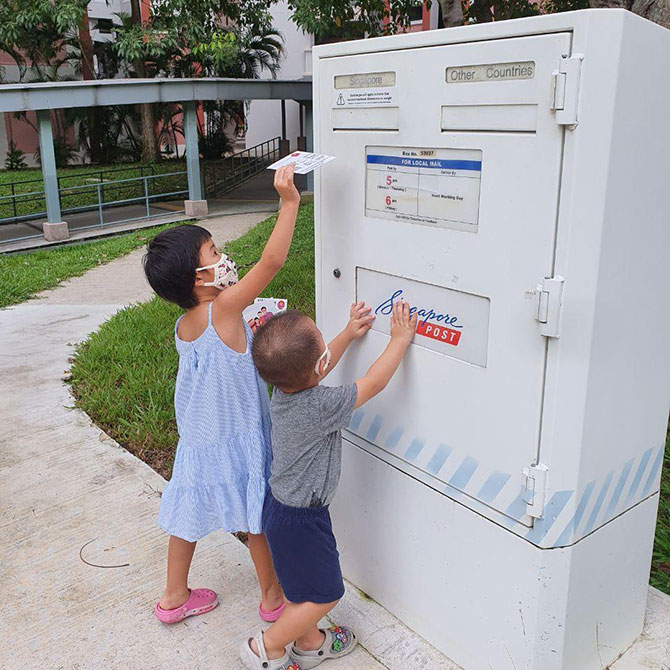
Can I be very honest and tell you that it’s the other way around? Every evening we take short walks round the estate. The kids wave and call everyone ‘uncle’ and ‘aunty’. They shout ‘hello’ at the Bus Uncle at the Bus Stop. They give their snacks, fruits and toys even to the cleaner that sweeps our corridor.
Most recently, Mya started her own library because the Public Library was closed, she said. Out of her little bookshelf, she packed stacks of books and got me to snail mail them to her friends. I was so worried about lost mail and damaged books, but she just kept giving.
On hindsight, it might also be the words we say, the books we read and the food we eat that helps! Saturday is always Prata day and Mya gets upset if her favourite Uncle isn’t there to take her order (and give her a Papadum snack).
Book choices wise, we are very intentional in highlighting how normal differences are and how normal is it that other cultures are similar / different from us. Be it colour / clothing or what the child is wearing to school for example.
Do you have a framework in asking your children important questions pertaining to prejudice and privilege?
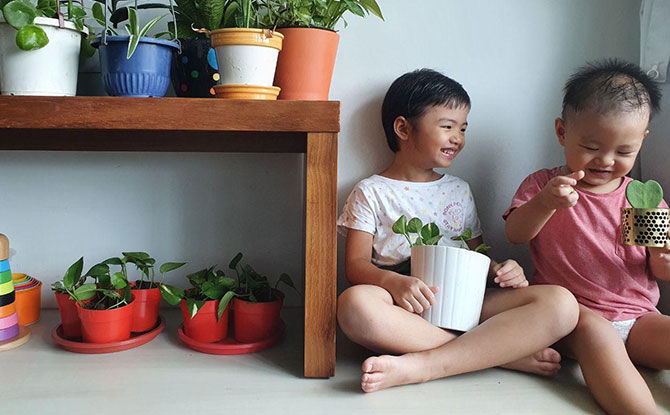
Beyond any framework is the way we live our lives. In this home, the most oft repeated philosophy is ‘live simply so others can simply live’. We never buy first-hand unless we absolutely have to, which is rare. We set aside money to give away first each month, so as to prevent spending it accidentally on ourselves. Close friends sometimes worry that we live too poorly and that our children suffer as a result of our choices, but we feel it is the opposite effect that has taken place. In the little they have, they enjoy giving to others and when they receive, the joy they feel is multiplied.
Then there’s our home. People come over for meals nearly once a week prior to the Circuit Breaker period. It’s just the way things have always been. Friends, family, troubled youth, struggling young couples etc. The children know this is an open house. Our gate is usually open so the kids on the floor can come in and play.
Our children may be too young to understand the concepts of prejudice and privilege, but they have all the means and all our support to be generous. Even if it means I give nearly half my fruits away on the way home from marketing (true story).
Based on your experience as a teacher, what kind of prejudices are prevalent in the children?
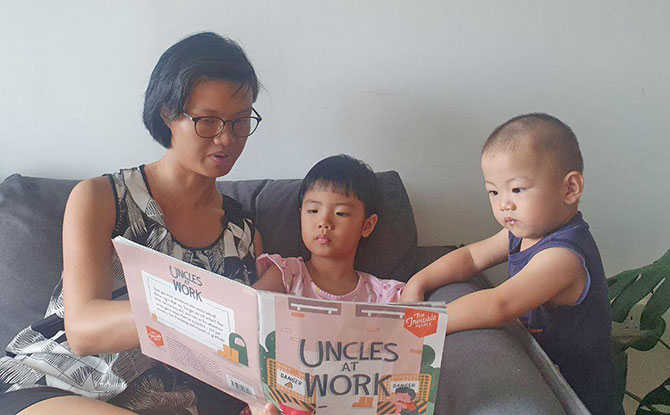
The only prejudices they could possibly have as young children are those impressed upon them by us, adults. I remember being warned by grandma that a Babu Singh would kidnap me if I were disobedient. Or if I did not study hard enough I would end up as a road sweeper.
Travelling with students has shown me prejudice borne out of ignorance. They think a people group are dirty because they toss their chicken bones on the floor (but they do it because its important for them to keep their tables and bowls clean). Or they think its outdated when schools’ separate boys and girls, but they neglect to see that it is because the religion that nation subscribes to values gender purity and equality.
Prejudice is a never-ending list of misunderstandings more than anything else. If we take time to talk to the homeless, hear their stories and know their reasons it will change us. It’s the same with most people we are afraid of or we hate at the workplace. Often times, being in their shoes, eating with them, visiting their homes changes everything.
I remember the criticisms I got from my own mummies community when I brought 18 month old Mya to a village on a visit. Its too dirty, too dangerous and too unhygienic they said. Conversely, she was so well taken care of I had my hands-off. Older kids helped to feed her, carry her and younger kids taught her to chase down chickens. Grannies brought her fresh fruit and snacks while the host family we lived with gave her their best mattresses and extra blankets. It is true that those who have way less and willing to give much more, because they have nothing to lose.
How can parents be role models to diminish prejudice in children?
Be teachable. Be intentional. Be honest.
There are many times I do not know and I tell the children I will find out. Now that Mya can read, we find out together. At the library, on the internet or by asking others.
Why do some uncles wear ‘skirts’? Why do postman not drive cars? Why does the grandpa at the petrol station have no stool to sit down? Why does grandma have to wipe tables at the kopitiam? And their endless list of questions go on.
We could just brush off their questions, but if we empower them to read, to interview, to photograph and so on – we just have to watch what they will do in return for that gift of new knowledge.
You will not have to work on diminishing prejudice in a child where there is none to begin with.
Somethings we learn by observation. Others we learn by asking sincerely. Eat with your right hand when you are having nasi lemak with your Malay Muslim friends. Bow respectfully to the dead at a Chinese Taoist funeral. Dress modestly if you are attending a wedding at a Hindu Temple.
What are some great resources to use to discuss such themes?
There is no greater resource than real-life. Allowing our children to ask the hard questions to the right people in a safe environment.
Then there are books, both fiction and non-fiction. Stories defying prejudice – the boy in the wheelchair who becomes the first scientist to discover a medicine made by ants. Or historical heroes – the despised little girl who grew up to become the First Lady, wife to the President of the United States. And so many more.
Some of the books include:
At the Same Moment, Around the World by Clotilde Perrin
Be Kind by Pat Zietlow Miller
Here We Are by Oliver Jeffers
Last Stop on Market Street by Matt de la Pena
One by Kathryn Otoshi
Peace is an Offering by Annette LeBox
People by Peter Spier
The Hundred Dresses by Eleanor Estes
These Colours are Bananas by Tamara Shopsin & Jason Fulford
This is how we do it by Matt Lamothe
To create a more lasting impression on the children, we tend towards themes rather than sporadic resources.
For example, this week Mya spoke to a grasscutter who happened to be learning for the first time how to use the grass cutting car in the void deck. So all this week we have been looking at the different machines used for cutting grass. What dangers are involved in grass cutting and so on. Her conclusion was that the safety goggles they wore were not safe enough, because their forearms and ankles were often left open and vulnerable to cut by stray pebbles etc.
Other like-minded parents are a huge resource as well. Their ideas, their language and their sharing. Nothing beats the sharing and building on each other’s lessons. I love learning from other mums, but more than that I am grateful that they are willing to share their resources!
How would you encourage families to reach out during the pandemic?
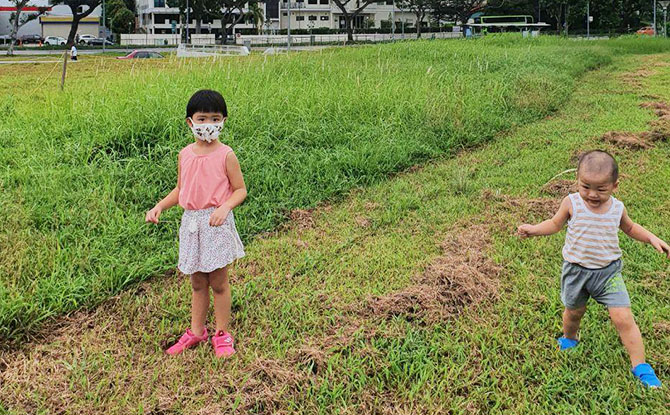
Be kind.
A kind word. A friendly smile. A book to spare for a neighbour’s kid. An afternoon snack for the granny who lives alone. A text to check in on a friend. A read-a-loud zoom session to read to your tired friend’s three children under the age of five.
We tell our children – give those who can give nothing in return.
Cans of coke sit in the fridge awaiting one of the kids to spot the bulky items uncle, or the food delivery man. We carry loose pieces of fruit on the way home from school in case we see crying child on the way home or the children’s beloved Aunty Postman doing a parcel run. We wait patiently with our hawker food while the kids ask the Kopi Aunty or Uncle about their day and what they are busy with.
In short, everyday life.
Our words, our choices and our actions.
Your Child will Notice the “Invisible” People If You Do Too
The gems Ames have shared are valuable for every parent. Especially in the challenging climate we are in, kindness and compassion go a long way. Your starting point can be a neighbour, the uncle and aunty downstairs or the public transport workers.
You can also choose to purchase Ames’ books from these vendors:
- Publisher @graceworkssg
- @monsterbookery
- @owlreadersclub
- @thetreasureboxsg
- @woodsinthebooks
- Kinokuniya
- Popular
For more on Ames’s books and parenting journey, follow her on Instagram @ameschen.
You may also enjoy learning about Short of Nothing, a book by Ames Chen.
READ: Books on Resilience to Encourage Children in Tough Times
This story contains affiliate links. This means we earn a small fee if you purchase something through a link from our website. There is no additional cost to you. This helps to support Little Day Out and keeps us going.





